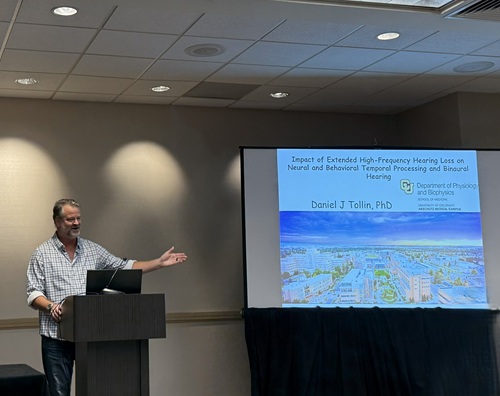APCS Newsletter
February 2026
This February edition of our society newsletter contains notes of interest regarding the updated composition of our board, a summary of the proceedings from APCAM 2025, and a report from the editors of Auditory Perception & Cognition.
Board Membership
We welcome two former members and one new member to the board this year. Laurie Heller, former Secretary of the Board returns in the capacity of Chair. Jenny Roche, long-time website manager for the society assumes the role of Treasurer, and Matt Wisnewski joins the board as a Member-at-Large. We thank exiting Chair Leah Fostick and former Member-at-Large Erica Knowles for their service. Lastly, after eight successful years organizing APCAM, Timothy Hubbard reached the end of his term as Chair of the APCAM Organizing Committee. This role has been taken up by former Treasurer, Laura Getz. We look forward to an exciting APCAM 2026 in her home town of San Diego!
APCAM 2025
(Courtesy of Timothy Hubbard, Chair of the Organizing Committee, timothyleehubbard@gmail.com)
Daniel Tollin speaks

The 24th Annual Auditory Perception, Cognition, and Action Meeting (APCAM) was held on Thursday, November 20, 2025 at the Denver Sheraton Downtown Hotel in Denver, Colorado. The Welcoming Remarks included a brief description of the mission statement of APCAM; an explanation of the relationship between APCAM, the Auditory Perception and Cognition Society (APCS), and the journal Auditory Perception and Cognition (AP&C); an appeal for submissions to AP&C; an explanation of the benefits of APCS membership; acknowledgement of material and financial support from the Psychonomic Society and the FindingFive online research platform; and an overview of the APCAM program.
There were 18 talks in sessions on music cognition and crossmodal perception; timing, cognitive control, and auditory scene analysis; auditory memory and imagery; and speech and language. A further 21 projects on a range of topics including auditory scene analysis; clinical issues and hearing loss; crossmodal perception; music cognition; and speech and language were presented as posters. Prof. Daniel Tollin from the University of Colorado School of Medicine also delivered an engaging keynote on The Impact of Extended High Frequency Hearing Loss on Neural and Behavioral Temporal Processing and Binaural Hearing.
During abstract submission, we had queried whether applicants would be interested in mentoring younger colleagues, and during the first break between sessions we provided an opportunity for potential mentors and mentees to meet.
There was a business meeting of APCS members, in which the financial state of APCS and the society’s journal AP&C were discussed; issues related to AP&C (e.g., meeting the goal of a minimum of articles, increases in readership, lack of an impact factor score) were discussed; the DEI membership and travel award was presented; ways in which APCAM attendees can get more involved in APCS were discussed; and the results of the officer elections for APCAM and APCS were announced.
The Concluding Comments included a brief description of when the idea for APCAM was initially conceived and acknowledgment of previous chairs (John Neuhoof, 9 years; Michael Hall and Mike Johnson, 7 years; Timothy Hubbard, 8 years). The current chair (Hubbard) noted that APCAM 2025 was his last to chair, and he thanked everyone for their participation and support and for the opportunity to have served the APCAM community.
Editor's Report to APCS membership
(Courtesy of Michael Hall and Michael Russell, Co-Editors of AP&C)
News for membership regarding the journal is generally promising. The size of readership continues to increase. Third quarter YTD article download statistics show an increase of 33 percent, which already exceeded the previous year’s total readership. In fact, downloads have increased every year since the journal’s inception. Online views have likewise continued to increase (at the time of writing, as many as > 6,800 views for an article, and > 500 views for a paper published as recently as October 2025; 21 papers have over 1,000 views). Author satisfaction generally remains very high.
In 2025, AP&C completed its 8th volume. Required publication minimums were reached on time. The journal continues to emphasize quality over quantity, publishing 16+ papers per year. As many members already know, AP&C is indexed in PsycInfo. An application for indexing in Scopus is ongoing.
The journal also is becoming more regularly referred to in other scholarly work. Citations of articles published in the journal have gradually continued to increase since AP&C was previously reviewed for possible indexing. Many articles are regularly cited, and at reasonable levels given the relatively small number of like-minded academics in the field (e.g., 30 citations for an article published in 2021; 22 citations for an article published in the 3rd quarter of 2024).
The option to publish brief reports associated with APCAM sessions continues for attendees, and a similar option was provided to presenters at the meetings of the International Society for Psychophysics, as well as for the Mind’s Ear and Inner Voice. The journal’s metrics improve as members choose to more frequently submit manuscripts for consideration. All APCS members are therefore encouraged to send submissions to AP&C. It bears reminding that members can ultimately choose to publish accepted papers in AP&C as open-access publications at a significantly reduced cost (25% off charges that are well below those of competitors).
